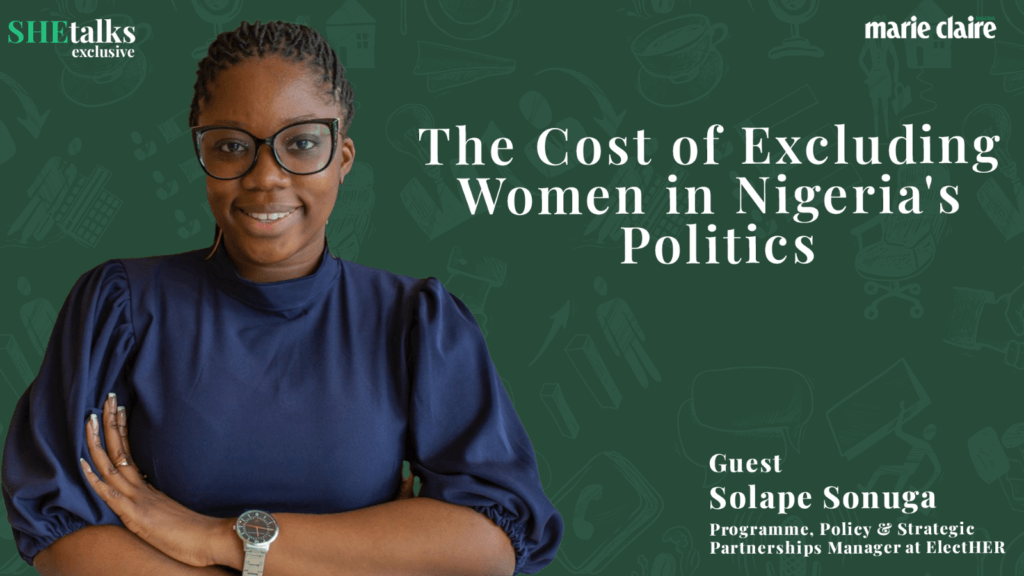“She Talks Exclusive” is an in-depth segment within the broader “She Talks” initiative, focusing on engaging with esteemed political, policy, and economics experts to tackle pressing issues affecting women today.
This platform highlights women’s challenges and explores actionable strategies and visionary insights for advancing women’s roles and rights. By facilitating meaningful conversations with thought leaders and change-makers, “She Talks Exclusive” aspires to illuminate the path forward, advocating for gender equality and empowering women to shape the future of societies worldwide.
In this insightful episode, we chat with Solape Sonuga from ElectHER about the glaring underrepresentation of women in politics. We delve into what society can lose from this imbalance and explore actionable solutions. The conversation yielded several critical insights, and while we highlight the key points here, the full depth of our discussion is captured in the complete podcast episode available here.

The statistics of women’s underrepresentation in Nigerian politics
The road to elections begins long before campaign season, tracing back to primaries in the preceding year. For the 2023 electoral cycle, the trajectory for female candidates was set mainly during these early stages. Many women found themselves edged out of contention or unable to secure a foothold in the race right from the primaries, highlighting a systemic barrier to their political participation and success.
A few women, such as Rukkayat Shittu, a senator representing Kwara State and the youngest political candidate in 2023, Natasha Akpoti, a senator representing Kogi Central, and others, even won their primaries in their various political parties. This shows how dire the situation is for aspiring women in politics.
Solape gave more details on the figures here. This contains the positions being run for and the number of candidates for each position according to gender:
 Overall, 1,553 female candidates ran for office in the primaries, and after the elections, only 72 women won across federal, state, and local government constituencies.
Overall, 1,553 female candidates ran for office in the primaries, and after the elections, only 72 women won across federal, state, and local government constituencies.
It goes even further than the nation. On a continental level, Nigeria currently ranks 54th out of 54 countries when it comes to the representation of women in parliament. This shows the dire state of Nigerian women regarding the actualisation of political aspirations.
The battles women face aspiring to political power
In my enlightening conversation with Solape, I was profoundly struck by the numerous challenges she detailed that women encounter on their path to political power. Here are some of the critical struggles she highlighted.
The many roles of a woman
Women have many roles to fulfil, from being mothers to being entrepreneurs, and yet they still run for politics. Some even have pretty decent outings at their campaigns.
Familial barriers
Women are faced with a lack of acceptance or support from not just their nuclear but extended families. They are more likely to face “disownment” if they enter politics.
The Bill of Indigeneship
At the National Assembly, there’s a controversial bill on indigenousness, which states that a woman cannot run under her previous state of origin if she is married. However, many times, people from the husband’s state of origin do not accept the woman, as she is only “married into the state” and is not an indigene from birth.
The practical solutions to boost more women into political leadership
According to Solape, there is a five-pronged approach toward the practical solutions necessary to even out the playing field for women:
Institutional support and policy reform
This means there is a need for more laws to be created to secure the position of women in government. If, for instance, there was a law stating that X women are to have X amount of seats in the legislature, there would be actionable penalties for not obeying the law, and thus, a massive chunk of the problem is already solved.
Solape also mentions the need for political will on the part of the male legislators as a necessary catalyst for more reforms.
Political party support
Solape mentioned the need for officials in political parties to support efficient women’s representation in politics so as not to “frustrate the process.” This involves gender-sensitive party structures and a more intentional approach to gender inclusion.
“Political parties are usually the first point of contact for all candidates. If their party doesn’t support women in politics, it is even more challenging for enforcing future laws.
The death of socio-cultural norms
“A woman’s place is in the kitchen,” amongst other stereotypes, is part of the obstacles holding women back from achieving their political goals amongst the people. Solape emphasised the need for citizens to approve and support women politicians, particularly in grassroots politics. To do this, there needs to be more communication geared towards shifting behavioural mindsets against women.
The narrative of the media
Also tied to the previous point mentioned is the negative media narrative towards women in politics. Solape suggested the need for regulations towards coverage of women politicians in the media, which would attract penalties if disobeyed.
Capacity building, mentorship, and financial mobilisation
Being able to build the capacity of women across all ages, mentorship of women’s political aspirants by successful female politicians, and creating financial resources for women aspirants by Civil Society Organisations (CSOs) are practical solutions towards preparing women ahead of political campaigns and elections.
Stay tuned for more in-depth conversations on She Talks Exclusive! You can listen to the full podcast here.


